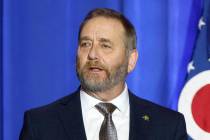Agency falters at planning
CARSON CITY -- The state Division of Emergency Management can't plan appropriate responses to emergencies and natural disasters because it fails to keep track of basic planning information, according to a legislative audit released Wednesday.
And although in 2006 the division reported to then Gov. Kenny Guinn that it had received an emergency plan from every state agency, the audit found that was not the case. Emergency Management failed to secure emergency preparedness plans from 53 of 96 state agencies, local governments, school districts, American Indian tribes and resort hotels.
Most of the plans it does have are out of date and auditors questioned whether the agency ever reviewed them.
Emergency Management also stopped keeping track of emergency response equipment owned by local governments, the state and other political subdivisions after an employee quit in 2006.
As a result, the audit found there is "little assurance" that the state and local governments can respond to emergencies or quickly locate equipment needed at critical times.
Legislators responded with disbelief to the findings, with Assemblywoman Sheila Leslie, D-Reno, calling it the worst audit she has seen in six years of serving on the Legislature's Audit Subcommittee.
To ensure the Emergency Management Division understood its mission, she read into the record the law that requires the agency to work with other governments, tribes and private companies to reduce the effect of disasters by planning appropriate responses and recovery programs.
"Why do you call yourself Emergency Management when you cannot do ordinary daily work?" asked Assemblyman John Marvel, R-Battle Mountain.
Deputy Emergency Management Chief Kamala Carmazzi said her agency is hampered because hotels, schools and tribes have been unwilling to give their emergency plans to the state and the agency lacks employees to do the necessary work. Carmazzi said there is no law to require hotels and others to submit their preparedness plans to the state.
Legislative Auditor Paul Townsend responded by quoting Frank Siracusa, chief of the Emergency Management Division.
During a June 27 meeting, Siracusa thanked the Legislature's Interim Finance Committee for allowing him to use federal grants to hire five additional employees, including one to handle planning matters. At the time, he said the additional employees would help him comply with the findings of the legislative audit.
In the period between 2003-07, the agency received $148 million in grants from the U.S. Department of Homeland Security.
Much of the money was given to Nevada after Congress and President Bush called for states and cities to prepare for another disaster like the Sept. 11, 2001 terrorist attacks.
Siracusa did not attend the Wednesday audit release because of a family medical emergency, said Carmazzi.
Despite its failure to obtain basic information needed to plan for emergencies, the Division of Emergency Management in a 2007 report to the Department of Homeland Security rated the state's planning efforts as a 5, with 5 as the best possible score.
In an unprecedented action, Emergency Management even rejected four recommendations by legislative auditors that specifies the steps that could be taken to comply with the law.
Carmazzi said her agency was not trying to pick a fight with legislators by rejecting the recommendations, but she did not want them to think that the division could comply with the audit without additional staff.
"I don't want to leave the impression that we have the ability to carry out what is requested today," she said.
Leslie requested that Gov. Jim Gibbons and state Public Safety Director Jerry Hafen examine the audit and the agency's response and come up with needed improvements before a December meeting.
Gibbons, however, was in Las Vegas when the audit was presented to the Legislative subcommitttee and did not hear the discussion. The audit covered the period from 2005 to the middle of 2007.
Dan Burns, the spokesman for Emergency Management and other Department of Public Safety agencies, said it was unfair for auditors to conclude that his agency cannot respond to emergencies.
"We have proven the state of Nevada is prepared," said Burns, pointing to the state response to the January flood in Fernley and the February earthquake in Wells.
"When something bad happens in the state, everybody on the staff responds, period," Burns said.
What the agency lacks is a computer database that contains emergency preparedness plans by local governments, tribes, hotels and others, according to Burns. But individual emergency response agencies know what equipment they have and have a good idea of what is available in surrounding communities, he said.
"When Beatty had a wildland fire, engines from Clark County went up there to protect the community," Burns said.
Burns said the agency is seeking federal funds for computer programs to allow it to keep track of equipment and emergency preparedness plans.























